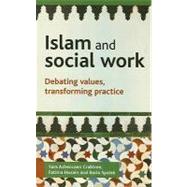
| List of case studies, figures and tables | p. viii |
| Acknowledgements | p. ix |
| Introduction | p. 1 |
| Aims and scope | p. 1 |
| Definition of terms | p. 5 |
| Organisation of the book | p. 5 |
| Addressing 'race' and ethnicity in social work | p. 7 |
| Social work, ethnocentrism and the influence of postmodernism | p. 8 |
| Reflectivity in social work | p. 11 |
| Sara's story | p. 12 |
| Fatima's story | p. 14 |
| Basia's story | p. 16 |
| The Muslim ummah: context and concepts | p. 19 |
| Introduction | p. 19 |
| The establishment of an Islamic community | p. 20 |
| The Qur'an, the hadith and the shari'a | p. 20 |
| Islam and Muslims | p. 21 |
| Fundamental principles of the ummah | p. 23 |
| Sacred spaces | p. 26 |
| Gender and Islam | p. 28 |
| Culture, faith and tradition | p. 29 |
| Denominational diversity | p. 29 |
| Nationalism and fundamentalism | p. 31 |
| Migration and Muslim communities in Europe | p. 32 |
| Politicisation and the quest for identity | p. 38 |
| Human dignity and insan al-kamil | p. 40 |
| Social work education and Islam | p. 43 |
| Addressing discrimination in social work education | p. 43 |
| Globalisation and social work | p. 45 |
| Teaching cultural diversity | p. 47 |
| Dominant pedagogies | p. 48 |
| Social work values | p. 49 |
| Islamic values | p. 52 |
| The welfare of the community | p. 54 |
| Individual freedom and social conformity | p. 55 |
| Conflict in values | p. 56 |
| Spirituality, epistemology and cosmology | p. 60 |
| Assessments and cultural diversity | p. 64 |
| Gender relations and the centrality of the family | p. 67 |
| Family morphology | p. 67 |
| Marriage | p. 73 |
| Parenthood and child-rearing | p. 76 |
| Sexuality | p. 78 |
| Conforming to gender norms | p. 80 |
| Modesty and propriety | p. 81 |
| Feminism and Islam | p. 85 |
| Working with families | p. 91 |
| Contemporary family conflicts: changing gender roles | p. 92 |
| Family crisis due to 'unlawful' sexuality | p. 93 |
| Divorce | p. 96 |
| Domestic violence: forms and features | p. 97 |
| Spousal abuse in the Muslim communities | p. 98 |
| Obtaining help | p. 100 |
| Sexual abuse of spouses | p. 103 |
| Forced marriage as domestic violence | p. 106 |
| Murder, 'honour' and domestic violence | p. 108 |
| Abuse of children | p. 110 |
| Adoption and fostering | p. 118 |
| Health issues and Muslim families | p. 123 |
| Medicine in historical Islam | p. 123 |
| Faith, culture and health | p. 123 |
| Reproduction | p. 125 |
| Genital mutilation | p. 130 |
| Disability and Islam | p. 135 |
| Mental health issues | p. 140 |
| End of life | p. 146 |
| Muslim communities, crime, victimisation and criminal justice | p. 153 |
| Introduction | p. 153 |
| 'Race'/ethnicity and criminal justice | p. 153 |
| Muslim communities and victimisation | p. 154 |
| Muslim communities and crime | p. 160 |
| Muslim communities, prisons and rehabilitation | p. 162 |
| Concluding remarks | p. 167 |
| Reflecting on aims | p. 167 |
| Values revisited | p. 167 |
| Considering oppression | p. 168 |
| Future directions for research | p. 170 |
| References | p. 171 |
| Index | p. 193 |
| Table of Contents provided by Ingram. All Rights Reserved. |
The New copy of this book will include any supplemental materials advertised. Please check the title of the book to determine if it should include any access cards, study guides, lab manuals, CDs, etc.
The Used, Rental and eBook copies of this book are not guaranteed to include any supplemental materials. Typically, only the book itself is included. This is true even if the title states it includes any access cards, study guides, lab manuals, CDs, etc.